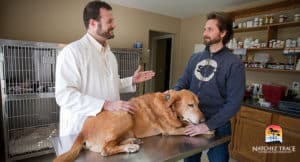Dysautonomia in dogs is a rare, progressive illness with an unknown origin that causes the autonomic nervous system to degenerate over time. As with humans, this is a fatal ailment.
In dogs, the disorder causes the autonomic nervous system to malfunction.
This system controls the unconscious bodily functions such as heart rate, digestion, respiratory rate, etc. Other parts of the nervous system can also be impacted.
Now you know how terrible dysautonomia in dogs can get. The question then is how to spot the signs as early as you can to give your pets a higher chance to prolong their lifespan.
Signs and Symptoms of Canine Dysautonomia
 Loss of pupillary light responses in the presence of otherwise normal vision is one of the most common signs. The eyeball’s posture may also be off, and the eyelid may droop or protrude unnaturally. The dog may lose control of the anal sphincter. Urinating may become painful or challenging.
Loss of pupillary light responses in the presence of otherwise normal vision is one of the most common signs. The eyeball’s posture may also be off, and the eyelid may droop or protrude unnaturally. The dog may lose control of the anal sphincter. Urinating may become painful or challenging.
Secondary signs including pneumonia and drowsiness.
The most typical symptom is the disturbance of your dog’s digestion; however, this might differ from case to case.
The neurological symptoms may cause your pet to behave in an awkward, bewildered, or drowsy manner. Your pet may also become incapable of standing.
If you are unsure or worried about your pet’s behavior, do not hesitate to contact a trusted veterinarian. It is always better to receive a negative diagnosis than to suffer the consequences of not knowing.
However, what should you do if you discover that your pet is afflicted with canine dysautonomia?
What is the Treatment for Dysautonomia in Dogs?
Even if dysautonomia in dogs is discovered early, there is currently no known cure. However, options to ease the symptoms and slow the degenerative process is possible.
The three reliable options to ease dysautonomia in dogs include:
1. Fluid Therapy
Water is the primary component of blood.
 When your dog suffers from dysautonomia, it is vital that you keep them hydrated. The problem though is most pets may find it difficult to drink water naturally, mainly due to losing autonomic nerve control.
When your dog suffers from dysautonomia, it is vital that you keep them hydrated. The problem though is most pets may find it difficult to drink water naturally, mainly due to losing autonomic nerve control.
Fluid therapy includes intravenous (IV) fluid, eye drops, and even liquid used to humidify air. Since this illness tends to dry your pets from the inside out, do your best to keep their fluids balanced.
This method also helps in dealing with urinary retention.
2. Specialized Diet
There is currently no way to completely stop your dog’s physical deterioration. As such, the best we can do to keep them alive and as healthy as possible is to make sure they eat the right amount of nutrients.
 Food therapy works best when you know what to give to your pets, so make sure to ask for help from a holistic vet. The diet can be mixed supplements to counter dysautonomia in dogs.
Food therapy works best when you know what to give to your pets, so make sure to ask for help from a holistic vet. The diet can be mixed supplements to counter dysautonomia in dogs.
Dysautonomia in dogs will also cause your pet to find it difficult to eat. Aid them carefully when they do so. In worse cases, your canine companion may no longer be able to control his body so you will have to feed him like a baby.
Make sure you feed him soft foods, those that do not require much work for the digestive system. You may even need to use a syringe. This is the best way you can assure that your poor pooch will not starve.
3. Vitamin-Based Treatments
 Your top priority when your pets get sick is to make sure their immune system is in their top condition. The same can be said for easing dysautonomia in dogs.
Your top priority when your pets get sick is to make sure their immune system is in their top condition. The same can be said for easing dysautonomia in dogs.
Moreover, vitamin-based treatments offer a wider range of choices for you to counteract your pet’s lack of natural nourishment. The best part about this option is that you can feed the vitamins as is, crush and mix them to your pet’s foods, or inject their liquid form through IV fluids.
Keep in Mind
 Severe dysautonomia can be life-threatening! If you are unable to schedule a visit with your regular vet, take your pet to the nearest veterinary clinic or hospital.
Severe dysautonomia can be life-threatening! If you are unable to schedule a visit with your regular vet, take your pet to the nearest veterinary clinic or hospital.
Do not wait for an appointment.
Contact us today if you have questions about dysautonomia or if your pet is exhibiting neurological symptoms.








